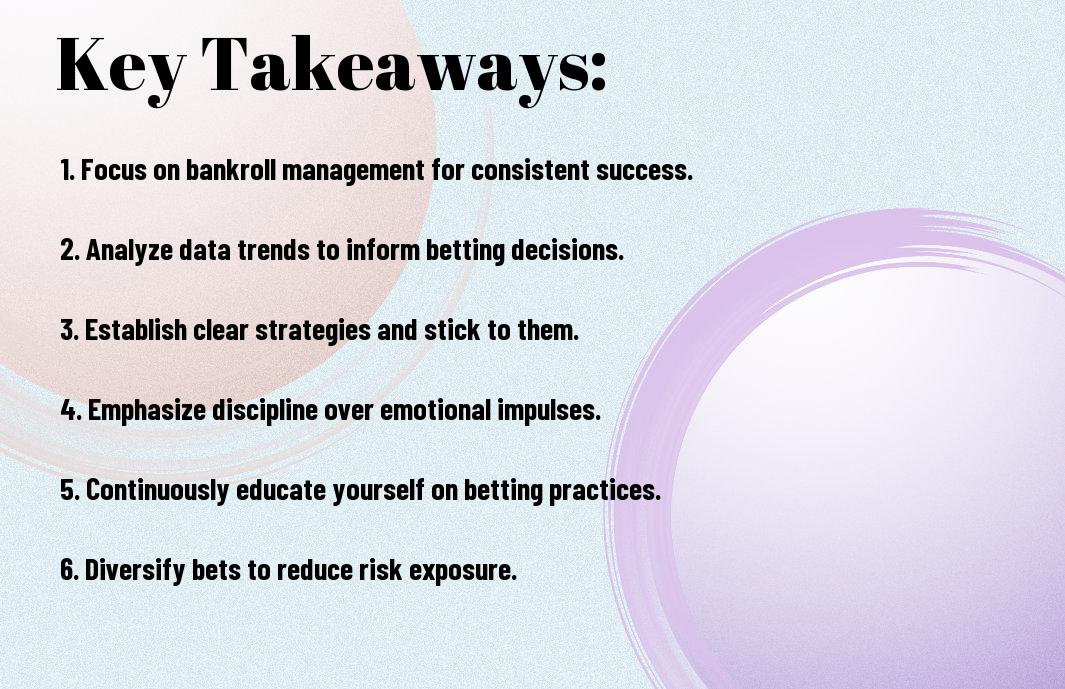As you initiate on your betting journey, you’ll want to create a system that yields consistent results over time. Your goal is to make informed decisions, minimizing losses and maximizing gains. To achieve this, you need a well-thought-out approach. You can start by learning How to Develop a Long-Term Sports Betting Strategy that suits your needs, helping you navigate the complex world of betting with confidence and precision.
Key Takeaways:
- Developing a betting system that stands the test of time requires a deep understanding of the underlying mechanics and probabilities of the games or sports being bet on, allowing for informed decision-making.
- A well-structured betting system should incorporate effective bankroll management, setting limits on bets to mitigate potential losses and ensure sustainability over the long term.
- Continuous learning and adaptation are crucial for maintaining a viable betting system, as market trends, team performances, and other factors can shift rapidly, impacting the system’s effectiveness.
- Emotional control plays a significant role in the success of a betting system, as making decisions based on emotions rather than strategy can lead to significant losses and undermine the system’s integrity.
- Regular review and analysis of the betting system’s performance are vital, providing insights into what works and what doesn’t, and guiding necessary adjustments to optimize outcomes and achieve long-term sustainability.

Core Principles of Sustainable Betting
While developing a sustainable betting system, you’ll need to focus on long-term success rather than short-term gains. Your approach should prioritize stability and consistency, allowing you to withstand losses and capitalize on wins.
Risk Management Foundations
Around the core of your betting system, you’ll need to establish a solid risk management framework. You should set clear limits and guidelines to govern your betting decisions, ensuring that you’re always in control of your wagers.
Bankroll Distribution Methods
Along with a well-structured risk management plan, you’ll need to adopt effective bankroll distribution methods. You can allocate your funds across various bets, minimizing exposure to significant losses and maximizing potential returns.
Due to the importance of bankroll distribution, you should consider implementing a strategy that suits your betting style and goals. You can explore different methods, such as the Kelly Criterion or fixed-fraction betting, to optimize your bankroll allocation and achieve long-term sustainability in your betting endeavors.
Data-Driven Decision Making
If you want to build a sustainable betting system, you need to make informed decisions based on data. This involves collecting and analyzing data to identify trends and patterns that can inform your betting strategy. By using data-driven decision making, you can minimize the impact of emotions and biases on your betting decisions.
Statistical Analysis Tools
Among the various tools available, you can use statistical models and software to analyze data and make predictions. These tools can help you identify trends and patterns in the data, and make more accurate predictions about future outcomes. You can use these tools to analyze historical data and make informed decisions about your betting strategy.
Performance Metrics Tracking
Driven by the need for continuous improvement, you should track your performance metrics to evaluate the effectiveness of your betting strategy. You can use metrics such as return on investment, win-loss ratio, and profit margin to assess your performance and make adjustments to your strategy as needed.
To track your performance metrics effectively, you will need to set clear goals and objectives for your betting strategy, and establish a system for collecting and analyzing data. You can use spreadsheets or specialized software to track your metrics, and adjust your strategy accordingly. By regularly reviewing your performance metrics, you can identify areas for improvement and make data-driven decisions to optimize your betting strategy and achieve your goals.
Psychological Framework
Unlike other aspects of betting, your psychological framework is vital for making informed decisions. You need to develop a mindset that balances risk and reward, allowing you to make rational choices.
Emotional Control Techniques
Above all, you must learn to manage your emotions to avoid impulsive decisions. You can achieve this by setting clear goals and practicing self-discipline, enabling you to stay focused on your long-term objectives.
Long-term Mindset Development
About the most significant challenge you will face is adopting a long-term perspective. You must be willing to withstand short-term losses and stay committed to your strategy, even when faced with adversity.
A key aspect of long-term mindset development is learning to evaluate your performance objectively. You should regularly assess your progress, identifying areas for improvement and adjusting your strategy accordingly, allowing you to refine your approach and increase your chances of success over time.

System Documentation
For a sustainable betting system, you need to maintain accurate records and track your progress. This involves creating a comprehensive documentation of your system, including rules, strategies, and performance metrics. By doing so, you can refine your approach and make informed decisions to improve your betting outcomes.
Record Keeping Methods
Documenting your betting activities is important for evaluating your system’s effectiveness. You can use spreadsheets, journals, or specialized software to log your bets, track your wins and losses, and monitor your bankroll. This helps you identify patterns, analyze your performance, and adjust your strategy accordingly.
Performance Review Protocols
Below the surface of your betting system lies a complex array of metrics and indicators. You will need to establish a routine to assess your performance, identifying areas of strength and weakness, and making adjustments to optimize your results. This process helps you stay on track and achieve your long-term goals.
Protocols for reviewing your performance should be tailored to your specific needs and goals. You can set regular intervals to evaluate your progress, using metrics such as win-loss ratios, return on investment, and bankroll growth. By analyzing these metrics, you can refine your strategy, address any issues, and make data-driven decisions to improve your betting outcomes.
Market Selection Strategy
After developing a solid understanding of betting systems, you’ll need to focus on selecting the right markets to apply your strategy. This involves analyzing various factors, including market trends, odds, and potential returns, to maximize your chances of success.
Identifying Profitable Markets
With a thorough understanding of market dynamics, you can identify profitable markets that align with your betting system. You’ll need to consider factors such as market liquidity, volatility, and the competitive landscape to make informed decisions.
Avoiding Common Pitfalls
Any successful betting system relies on avoiding common pitfalls, such as chasing losses or betting on emotionally driven decisions. You must stay disciplined and focused on your strategy to achieve long-term success.
Identifying potential pitfalls is key to avoiding them, and you should continually assess your betting system to identify areas for improvement. By doing so, you can refine your approach and minimize the risk of making costly mistakes, ultimately protecting your bankroll and increasing your chances of achieving your betting goals.
System Evolution
Many betting systems fail to stand the test of time, but with a well-planned approach, you can create a sustainable one. Your system will need to adapt to changes in the market and your own growth as a bettor. By continuously evaluating and refining your strategy, you can ensure long-term success.
Adaptation Mechanisms
Among the key factors to consider when evolving your system are your risk tolerance, betting frequency, and bankroll management. You will need to adjust these elements as you gain experience and your goals change, allowing your system to remain effective and aligned with your objectives.
Growth Indicators
Beside the obvious metrics such as profit and loss, you should also track other indicators of your system’s performance, such as return on investment and betting volume. You can use these metrics to identify areas for improvement and make data-driven decisions to optimize your strategy.
For instance, if you notice that your return on investment is decreasing over time, you may need to re-evaluate your betting selections or adjust your staking plan to maximize your returns. By monitoring your growth indicators and making adjustments as needed, you can ensure that your system continues to perform well and help you achieve your long-term betting goals. You will be able to make informed decisions and stay on track, even as the betting landscape evolves and your own skills and knowledge grow.
To wrap up
On the whole, you have now gained insights into building a sustainable betting system for the long haul. You can create a robust strategy by setting clear goals, managing your bankroll, and continuously evaluating your approach. By doing so, you will be able to make informed decisions and maintain a steady pace, ultimately leading to your success in the betting world, where your patience and discipline will be rewarded over time, and your betting system will yield positive results for your efforts.
FAQ
Q: What are the key components of a sustainable betting system for the long haul?
A: A sustainable betting system for the long haul involves several key components, including a well-defined strategy, effective bankroll management, and a thorough understanding of the sports or events being bet on. It’s also vital to set realistic goals and expectations, as well as to continuously monitor and adjust the system as needed. Additionally, a sustainable system should prioritize risk management, diversification, and adaptability to ensure long-term success. By incorporating these elements, bettors can increase their chances of achieving consistent profits and minimizing losses over time.
Q: How can I develop a betting strategy that stands the test of time and adapts to changing circumstances?
A: Developing a betting strategy that stands the test of time requires a combination of research, analysis, and flexibility. It’s vital to stay up-to-date with the latest trends, statistics, and news related to the sports or events being bet on. Bettors should also be willing to adjust their strategy as circumstances change, such as changes in team performance, player injuries, or shifts in market trends. Furthermore, it’s vital to continuously evaluate and refine the strategy, identifying areas for improvement and making adjustments accordingly. By doing so, bettors can ensure their strategy remains effective and profitable over the long haul.
Q: What role does discipline play in maintaining a sustainable betting system, and how can I cultivate it?
A: Discipline plays a vital role in maintaining a sustainable betting system, as it enables bettors to stick to their strategy and avoid impulsive decisions. Cultivating discipline involves setting clear rules and guidelines, such as strict bankroll management and bet sizing, and adhering to them consistently. It’s also vital to avoid chasing losses, betting on emotions, or deviating from the strategy due to short-term fluctuations. By establishing a disciplined approach, bettors can minimize the impact of variance, stay focused on their long-term goals, and increase their chances of achieving success. Regular self-assessment and reflection can also help identify areas where discipline may be lacking, allowing for adjustments to be made and improvements to be implemented.



